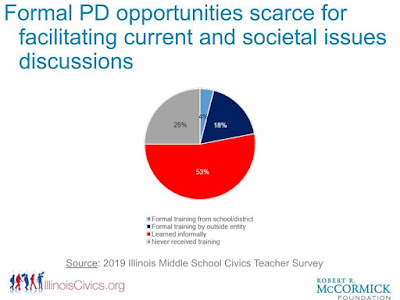Understanding the Proven Practice of Current and Controversial Issue Discussions
by Mary Ellen Daneels, Civics Instructional Specialist
This fall, middle schools will join their colleagues in high school in requiring at least a semester of civics for students in the curriculum. The mandate goes beyond “what” to teach, but also “how” to teach using the proven practices of civic education. This week’s topic was Understanding the Proven Practice of Current and Controversial Issue Discussions, which is especially fitting in light of recent events. If you missed it, we shared classroom room resources to address issues of racial injustice earlier in the week in our blog, Be Present, Listen, and Refuse to Be Silent.
IllinoisCivics.org joined with our partners at the Center for Information and Research on Civic Learning and Engagement (CIRCLE) to survey middle school educators in the Land of Lincoln about their needs and concerns regarding the new civic mandates. As Dr. Shawn Healy, Director of the Democracy Program at the Robert R. McCormick Foundation shared in the webinar, formal professional development opportunities are scarce in supporting classroom deliberations (see chart below). However, the need for student-to-student dialogue is clear in this current era of polarization. As one respondent to the survey shared,
I think a lot of us could use some focused discussion and learning to support how we hold a discussion in our classrooms in an increasingly polarized society. I also think that teaching students how to discuss issues with those who strongly disagree with them is an essential component of developing informed, knowledgeable, and invested citizens.
IllinoisCivics.org is committed to bridging the professional development opportunity gap in Illinois and supporting teachers in preparing ALL students for civic life. Our IllinoisCivics.org website has:
- A Curriculum Design Toolkit with resources to help you identify assets in your curriculum and resources to meet any needs for civics course implementation.
- Lesson plans aligned with the Illinois Social Science standards and proven practices of civic education.
- A Distance Learning Toolkit that curates resources to iterate the proven practices of civic education in a blended format.
- An Election 2020 Toolkit with materials for current and controversial issue discussions as well as the other proven practices of civic education this election year.
At the end of each webinar, several Illinois Civics Instructional Coaches share their top strategies and resources for implementation. This week, the coaches shared a resource they would encourage teachers to start with to support student discussions.
- Alia Bluemlein from Crystal Lake shared, “Something I continue to work on as an educator is helping students to understand their own biases prior to engaging in current/controversial issue discussions, and how these biases might impact their perspective. The language of implicit/explicit/confirmation is so helpful to frame these conversations, and Facing History and Ourselves provides great resources for facilitating these discussions”.
- Chris Johnson from Oneida recommends educators explore ProCon.org. “Pro-Con is a good resource to send students to when researching controversial issues. It contains lists of topics and is searchable. Once a topic is selected, readers are presented with a summary and numerous articles on both sides of the topic or issue. It's a great starting point for research on a topic.”
- Heather Monson from East Moline shared, “Just recently the National Museum of African American History and Culture developed some excellent resources on how to discuss race with all ages. I really like this resource because it offers support to various “groups”; educators, parents, individuals, and caregivers. I think it is significant in that it offers a way to discuss racial identity as well as offers foundational texts. This includes information about historical foundations (resources to use within the classroom) how to be anti-racist and anti-bias. The Bias information is excellent and offers some real-world classroom scenarios to embrace. This site includes book suggestions, videos to review, and various diagrams, and text.“
- Matthew Wood from West Chicago likes Kialo. “If you’re on Twitter, Kialo is probably something that has popped up in your feed as sponsored content. Kialo is the perfect resource to help students master critical thinking and reasoning skills. It allows kids to introduce questions, the chance to discuss those thoughts, and even to evaluate claims.”
What are you doing to implement the middle and high school civics requirements? Please comment below. Together we can prepare ALL students for college, career, and civic life.





Comments
Post a Comment